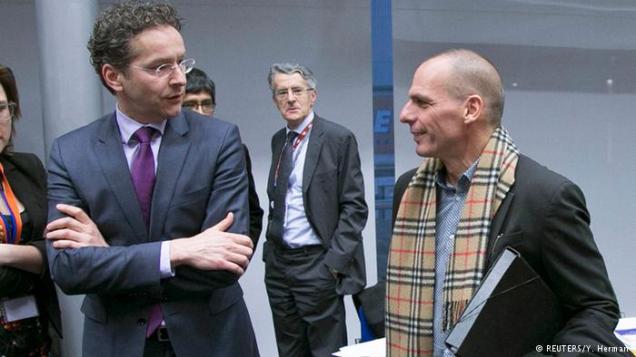As I watched Dutch Finance Minister, Jeroen Dijsselbloem, brief the press core on the collapse of yesterday’s Eurogroup meeting, Trotsky’s acerbic put-down of Tsar Nicholas II came to mind: “It seemed as though between his consciousness and his epoch there stood some transparent but absolutely impenetrable medium.”
The stance of the European Finance Ministers in recent days has been close to financial fanaticism. Tied together by a currency union designed to play by German rules of fiscal austerity, the Eurozone countries have all toed the official-line since the election of Syriza in January: The terms of financial bailout enforced by the Troika are non-negotiable. Yes, the Dutch Finance Minister claimed that there is some flexibility in the current programme, but only if it continues to be implemented on the Greek side. As is now being openly discussed in the corridors of Brussels, Greece has long since lost its financial autonomy.
But can this really be the end of the road? This week looks likely to offer a definitive answer to this question and it is hard to see what could unblock negotiations. As I have said over recent weeks, Syriza cannot concede much more from its side of the table. Its extraordinary election success was built on a backlash against austerity and Troika policy. To go back on their electoral promises and swallow whole the medicine being forced upon them by the creditors would be a crushing defeat for national democracy and one which would surely blow Greek politics (and society) apart.
A glimmer of hope was offered by Luxembourg’s finance minister, Pierre Gramegna, this morning with his comment that, “we can’t remain in a blockade so everyone has to move a bit, water-down demands so we can find a compromise.” Finally, common sense seemed to have found away into this impasse. But Gramegna’s comments were tempered by his adherence to the Eurogroup’s core position: “There are flexibilities in the programme, we have to make use of them. When the Greeks are against the programme and don’t want to work in this framework it will be tough.”
My position in recent weeks has been that that all sides have much to lose if Greece exits the single currency. I have felt therefore that a last minute compromise has always been likely to avoid the financial, political and, possibly, social contagion that could arise following a Greek departure. But if this is indeed still on the cards then it is going to go down to the wire. The yield on Greece’s 3-year bond has jumped up 200bps to 19.7% this morning, while the 10-year bond has surged beyond 10%. Investors are increasingly coming round to the fact that Greece will default on its loans. Capital continues to fly out of the country and the pressure to bring in capital controls is mounting by the hour.
But what is the gameplan of the creditors here? I find it ridiculous that they insisted on referring to the existing bail-out terms last night when they could have used some semantic wizardry to call it a new bridging agreement and given all sides something that they could have worked with in the short-term. Perhaps, then, they really are ready to see Greece go, even though they may not be able to manage the fallout. First of all, let’s consider what message this sends to the markets. As soon as it becomes clear that Euro membership is revocable and that the Eurozone’s lack of flexibility and lack of fiscal transfer mechanism means it can no longer offer full support to struggling members, Eurozone bonds will become a very different prospect. It’s all very well Portugal being touted as an economy that has taken its fiscal medicine and responded well, but what happens when its bond yields go through the roof following a Grexit? Likewise for Spain, Ireland and others. But perhaps from the position of the creditors this is the point. It looks more and more like they aim to make an example of Greece. Although the markets may not respond well to the newly precarious nature of Eurozone membership, it sends a clear message to other indebted states, particularly those flirting with anti-austerity politics: Play by the rules or you are on your own.
But let’s think also of the message this sends to the people of Europe. As the humanitarian situation in Greece worsens the message to Eurozone citizens is this: Your needs are secondary to our quest for financial stability and market-harmony. The social fabric of the whole project will have been ruptured beyond repair. It will be a less than tacit admission that the EU is a tool for trade and capital liberation, and nothing more. A tool therefore for supporting commerce and business at the expense of widening class divisions and inequality. The words and actions of the Eurogroup last night bring to mind another of Trotsky’s observations, and one which is just as relevant this week as it was a century ago:
“’Everything for the war!’ said the ministers, deputies, generals, journalists. ‘Yes,’ the soldier began to think in the trenches, ‘they are all ready to fight to the last drop…of my blood.'”

I have to admit things are looking a little “shakey”. However, despite all claims to the contrary, there is something in the “air”. To quote Divine in the original John Water’s Hairspray: “oh the times they are a changing. I just know there’s something blowing in the wind!”. My hope is that the left platform of Syriza has the strength and determination to engage the masses and lead the way into a new future. Their 30% + other left and communist groups is larger than the so called reformist majority. It is a question of leadership. Thanks once again for an interesting post.
LikeLiked by 1 person
Thanks for the comment, Arthur. I agree that there is something in the air and this still has some way to go…
LikeLike